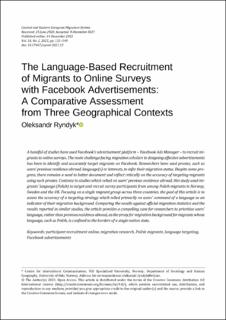The language-based recruitment of migrants to online surveys with facebook advertisements: A comparative assessment from three geographical contexts
Peer reviewed, Journal article
Published version
Permanent lenke
https://hdl.handle.net/11250/3048253Utgivelsesdato
2021Metadata
Vis full innførselSamlinger
- Artikler / Articles [1185]
- Publikasjoner fra CRIStin [1132]
Originalversjon
Central and Eastern European Migration Review. 2021,10 (2), 131-149. 10.17467/ceemr.2021.13Sammendrag
A handful of studies have used Facebook’s advertisement platform – Facebook Ads Manager – to recruit migrants to online surveys. The main challenge facing migration scholars in designing effective advertisements has been to identify and accurately target migrants on Facebook. Researchers have used proxies, such as users’ previous residence abroad, language(s) or interests, to infer their migration status. Despite some progress, there remains a need to better document and reflect critically on the accuracy of targeting migrants using such proxies. Contrary to studies which relied on users’ previous residence abroad, this study used migrants’ language (Polish) to target and recruit survey participants from among Polish migrants in Norway, Sweden and the UK. Focusing on a single migrant group across three countries, the goal of this article is to assess the accuracy of a targeting strategy which relied primarily on users’ command of a language as an indicator of their migration background. Comparing the results against official migration statistics and the results reported in similar studies, the article provides a compelling case for researchers to prioritise users’ language, rather than previous residence abroad, as the proxy for migration background for migrants whose language, such as Polish, is confined to the borders of a single nation state.
Beskrivelse
This article is distributed under the terms of the Creative Commons Attribution 4.0 International License (http://creativecommons.org/licenses/by/4.0/), which permits unrestricted use, distribution, and reproduction in any medium, provided you give appropriate credit to the original author(s) and the source, provide a link to the Creative Commons license, and indicate if changes were made.

